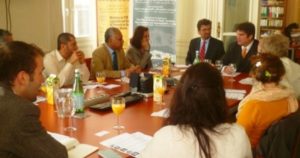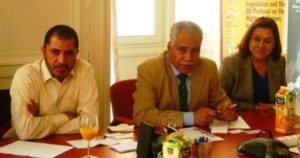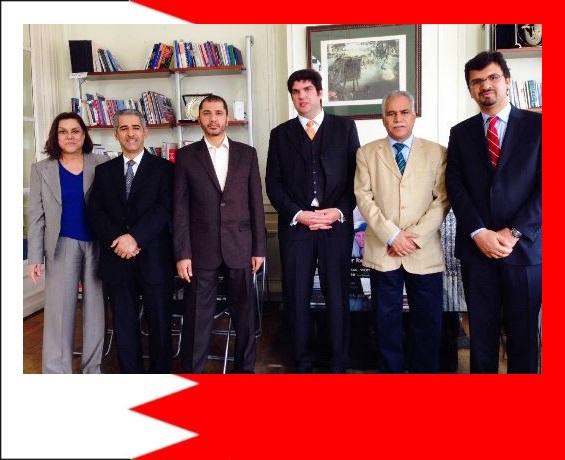The delegation included Sheikh Ali Salman, Secretary General of Al Wefaq, Radhi Al-Mosawi, Secretary General of Waad Society (National Democratic Action Society), Dr. Munira Fakhro, academic and Vice President of Waad Society (National Democratic Action Society), Abdulnabi Salman, Secretary General of Al-Minbar Society (Democratic Progressive Tribune), and Ali Alaswad, Resigned MP of Al Wefaq.

On this occasion, No Peace Without Justice (NPWJ) convened a roundtable discussion to discuss the current situation and prospects for the future of the country. The meeting, which was hosted by Niccolo’ Figa’-Talamanca, NPWJ Secretary-General, in NPWJ Brussels office, saw the participation of representatives from international NGOs, including Human Rights Watch, Amnesty International, Partnership for Democratic Change International (PDCI) and Human Rights Without Frontiers (HRWF).
The meeting provided an opportunity for the Bahraini delegation to highlight the ongoing deteriorated human rights situation in the country. Despite repeated promises to implement the recommendations issued by the Bahrain Independent Commission of Inquiry (BICI) in November 2011 as well as by the UN Human Rights Council (HRC) in May 2012, the regime in Bahrain has failed to deliver any meaningful reform program. Worse, it continues to deny to a majority of Bahrainis their fundamental rights on a daily basis. Prominent civil society activists and human rights defenders, including minors, are still being exposed routinely to harassment, arbitrary detention and imprisonment, ill-treatment and unfair and politically motivated trials leading to harsh sentences for having participated in peaceful demonstrations or criticised officials.

The delegation explained that the very first steps to solve the political constitutional crisis, is to halt the human rights abuses against the Bahraini people, as well as to release all prisoners of conscience and human rights defenders in detention for exercising their right to free expression and peaceful assembly, starting with young people, women, the elderly and those suffering from illnesses or deformities. The Government of Bahrain must also establish credible and impartial accountability mechanisms to address past violations and to prevent continuing abuses, as recommended by the BICI report and the UPR mechanism. Furthermore, Bahraini authorities should cooperate fully with the human rights monitoring mechanisms of the United Nations and its Special Rapporteurs, in order to allow for an independent assessment of human rights conditions, particularly on freedom of association and assembly, on the situation of human rights defenders, torture and fair trial.
The Bahraini delegation also underscored clearly the need for support and engagement throughout the region, which is essential to bring the country in the right path and will help anchor Bahrain to democracy and rule of law and to restore peace, stability and development.The international community has also a responsibility to ensure that the Bahraini authorities do not persist in the ongoing repressive and retaliatory strategy against democratic advocates rather than complying with their obligations.
The delegation emphasized that the opposition parties’ participation in the upcoming elections scheduled in November 2014 is conditioned by core reforms allowing all those who are committed to peaceful and nonviolent dialogue to be able and free to contribute fully to the political process. Key demands of the democratic movement are well-known: reform of the executive authority so as to truly represent the people of Bahrain; a full-power legislative and monitoring authority; an independent judiciary and a fair electoral system based on the one-person-one-voice principle.
Documentation
- Presentation of the Bahraini delegation
- NPWJ Policy Paper on Bahrain
- Special section on NPWJ Bahrain Project
For further information, contact Gianluca Eramo on geramo@npwj.org or +32-2-548-3912 or Nicola Giovannini on ngiovannini@npwj.org or +32-2-548-3915.



